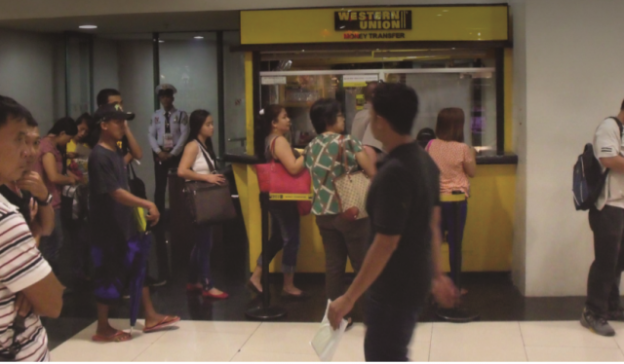MANILA: The apex bank of the Philippines has blamed the derisking strategy of foreign banks behind a decline in remittances by overseas Filipinos.
“We are seeing the continuing narrative of derisking, upsetting the otherwise normal flow of remittances,” Manila Times quoted Bangko Sentral ng Pilipinas (BSP) Deputy Governor Diwa Guinigundo as saying.
The strategy is mainly driven by the business decisions of foreign correspondent banks in weighing the risks and benefits of dealing with remittance companies, and in the process closing the accounts of several money transfer operators (MTOs), to limit their exposure to possible money laundering channels and other financial crimes, the report said.
Guinigundo reportedly said derisking increases the cost of money transfers, because additional costs are incurred in complying with anti-money laundering and counter terrorist financing requirements.
“In fact even the Arab Monetary Fund, IMF [International Monetary Fund] and The World Bank have documented various cases of derisking in the Middle East jurisdictions,” he was quoted as saying.
Latest data from the BSP showed a year-on-year drop in personal and cash remittances in July. Personal remittances reportedly stood at $2.35 billion in July, down 5.4 percent from $2.49 billion year earlier, and were also lower compared with the $2.57 billion in June.
Personal remittances are transfers in cash or in kind, as well as capital transfers between households. In the seven months to July, the rise in personal remittances slowed sharply to 2.9 percent – from 7.4 percent a year earlier – at $16.92 billion from $16.44 billion, said the news portal.
Cash remittances reportedly coursed through banks totaled $2.13 billion in July, down 5.4 percent from $2.25 billion registered in July 2015. In June, cash remittances totaled $2.33 billion.
In the first seven months of the year, the 3 percent growth rate in cash remittances was slower compared with 7.7 percent in January to July 2015.
The BSP official explained derisking in the Middle East is related to concerns about money laundering and terrorist financing.
The Middle East is one of the major sources of overseas Filipino remittances, with 80 percent of total cash remittances coming from Saudi Arabia, the United Arab Emirates (UAE), Qatar and Kuwait.
Exacerbating the impact of derisking is weak oil prices, which dampens the propensity of Saudi Arabia, UAE and other oil producing markets to overseas workers with jobs, Guinigundo reportedly pointed out.
Providing an optimistic view is IHS Markit Asia-Pacific chief economist Rajiv Biswas, who said that despite the 5.4 percent drop year-on-year, the overall level of remittances in the first seven months of 2016 has remained stable.
“However there is evidence that several negative factors are impacting on remittances,” he was quoted as saying.
Biswas reportedly noted the derisking of relationships by correspondent banks with remittance firms as part of risk management procedures is making it more difficult for Filipino workers abroad to remit funds home.
“This derisking process has been underway well before the RCBC case, so is not mainly driven by that event, but reflects a wider international trend among banks globally to tighten up their relationships with other financial firms due to fears about potential money laundering vulnerabilities,” he reportedly said.
RCBC is the Rizal Commercial Banking Corporation, which figure in the money laundering scandal that involved $81 million of stolen funds from the Bagladesh Bank’s account with the Federal Reserve Bank of New York. RCBC was slapped a P1 billion fine by the BSP for ignoring anti-money laundering protocols, the biggest regulatory fine in the history of the Philippine banking industry.
The IHS Markit economist noted the impact of lower oil and gas prices has weighed on growth in the Middle East oil producing countries – key employment hubs for overseas Filipinos.
“Middle East financial institutions have also been derisking their financial relationships, due to the global pressure on Middle East nations to crack down on illicit financial flows related to terrorism and money laundering,” he added.
Preliminary data from the Philippine Overseas Employment Administration (POEA) reportedly showed the number of newly hired land-based workers dropped 10.3 percent year-on-year to 235,895, while that of sea-based workers fell by 44.4 percent to 134,360.
“While there is a likelihood that this might continue and affect OFW remittances this year, the more than 18 percent growth in BPO [business process outsourcing]revenues for the first six months of 2016 could, somehow, cushion the soft remittances flows,” Guinigundo was quoted as saying by Manila Times.






